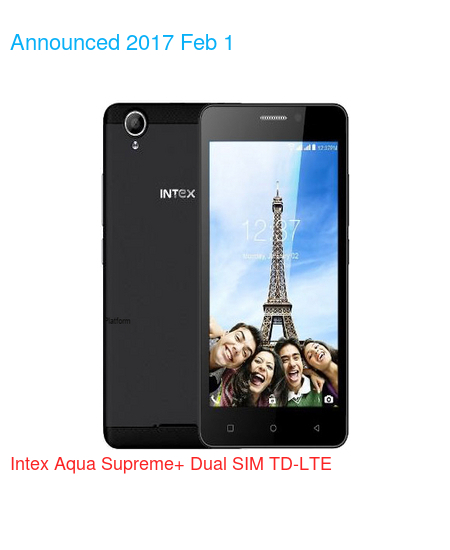| Brand | Intex |
| Model | Aqua Supreme+ Dual SIM TD-LTE |
| Released | 2017 Feb 7 |
| Announced | 2017 Feb 1 |
| Hardware Designer | Intex Mobile |
| Manufacturer | Intex Mobile |
| General Extras | Haptic touch feedback |
| Device Category | Smartphone |
| Width | 72.3 mm |
| Height | 143 mm |
| Depth | 7.95 mm |
| Dimensions | 2.85×5.63×0.31 inches |
| Mass | 133 g |
| Platform | Android |
| Operating System | Google Android 6.0 (Marshmallow) |
| Software Extras | Navigation software |
| CPU Clock | 1300 MHz |
| CPU | MediaTek MT6737, 2016, 64 bit, quad-core, 28 nm, ARM Mali-T720 GPU |
| RAM Type | LPDDR3 SDRAM |
| RAM Capacity (converted) | 2 GiB RAM |
| Non-volatile Memory Interface | eMMC 5.0 |
| Non-volatile Memory Capacity (converted) | 16 GB ROM |
| Display Diagonal | 127 mm |
| Resolution | 720×1280 |
| Horizontal Full Bezel Width | 10.04 mm |
| Display Area Utilization | 66.7% |
| Pixel Density | 294 PPI |
| Display Type | Color IPS TFT LCD display |
| Number of Display Scales | 16.8M |
| Scratch Resistant Screen | Yes |
| Graphical Controller | ARM Mali-T720 |
| GPU Clock: | 550 MHz |
| A/V Out | No |
| Microphone(s) | stereo |
| Loudspeaker(s): | mono |
| Audio Output: | 3.5mm |
| Supported Cellular Bands | GSM850 , GSM900 , GSM1800 , GSM1900 , UMTS2100 (B1) , UMTS900 (B8) , LTE1800 (B3) , LTE850 (B5) , TD-LTE2300 (B40) bands |
| Supported Cellular Data Links | GPRS , GPRS C12 , EDGE , EDGE MSC12 , UMTS , HSUPA , HSDPA , HSPA+ 21.1 , LTE , LTE 100/50 , LTE 150/50 data links |
| SIM Card Slot | Micro-SIM (3FF) |
| Complementary Phone Services | Voice transmission , Voice speaker , Vibrate , Speakerphone , ANC , HD Voice , VoLTE |
| SAR (head) | 0.435 W/kg |
| SAR (body) | 1.210 W/kg |
| Dual Cellular Network Operation | Dual standby |
| Sec. Supported Cellular Networks: | GSM850 , GSM900 , GSM1800 , GSM1900 |
| Sec. Supported Cellular Data Links: | GPRS , EDGE |
| Sec. SIM Card Slot | Micro-SIM (3FF) |
| Touchscreen Type | Capacitive multi-touch screen |
| Expansion Interfaces | TransFlash , microSD , microSDHC , microSDXC |
| USB | USB 2.0 |
| USB Services | USB charging |
| USB Connector | USB Micro-B (Micro-USB) |
| Bluetooth | Bluetooth 4.0 |
| Wireless LAN | 802.11b , 802.11g , 802.11n |
| Wireless Services | Wi-Fi Tethering |
| FM Radio Receiver | FM radio (88-108 MHz) |
| Complementary Satellite Services | Simultaneous GPS , A-GPS , Geotagging , QuickGPS |
| Camera Placement | Rear |
| Camera Image Sensor | CMOS |
| Number of effective pixels | 13.0 MP camera |
| Aperture (W) | f/2.00 |
| Zoom | 1.0 x optical zoom |
| Focus | CD AF |
| Video Recording | 1920×1080 pixel |
| Flash | single LED |
| Camera Extra Functions | HDR photo , Red-eye reduction , Panorama Photo , Face detection |
| Aux. Camera Image Sensor | No |
| Aux. 2 Camera Image Sensor | No |
| Aux. 3 Camera Image Sensor | No |
| Aux. 4 Camera Image Sensor | No |
| Secondary Camera Placement | Front |
| Secondary Camera Sensor | CMOS |
| Secondary Camera Number of pixels | 5.0 MP sec. cam |
| Secondary Aperture (W) | f/2.20 |
| Secondary Video Recording | 640×480 pixel |
| Sec. Aux. Cam. Image Sensor | No |
| Built-in accelerometer | Yes |
| Additional sensors | L sensor , P sensor |
| Protection from solid materials | Yes |
| Protection from liquids | Yes |
| Battery | Li-ion polymer (LiPo) |
| Nominal Battery Capacity | 3000 mAh battery |
| Talk Time: | 6.0 hours |
| Market Countries | India , Vietnam |
| Market Regions | Asia |
| Mobile Operator | Reliance Jio Infocomm |
| Added | 2024-06-26 |
Specifications data description of this 📱Intex Aqua Supreme+ Dual SIM TD-LTE📱
Title: The Ultimate Specification Guide for Your Devices – 🌐NETWORK,LAUNCH📅,BODY🏋️,🌈 DISPLAY,🤖 OS 🛠️,🚀 Chipset 🔧,💪 CPU 🖥️,🎮 GPU 💻,🧠 MEMORY 🗂️,📷 CAMERA 🎥,🔈 SOUND 🎵,📡 COMMS 📶,💡 FEATURES 🎁,🔋 BATTERY🔌
Introduction:
Welcome to our comprehensive specification guide for your devices! In this blog post, we will break down and explain the meaning of all the important technical terms related to your device’s features and capabilities. From network connectivity and operating systems to chipsets, cameras, and battery life, we’ve got you covered. Whether you’re a tech enthusiast or just looking to brush up on your knowledge, this guide will help you make informed decisions when purchasing or using your device.
Lineup:
In this guide, we will cover the following key categories:
* 🌐Network: This refers to the device’s ability to connect to the internet and other devices via Wi-Fi, cellular, or Bluetooth connections.
* 📅Launch: This refers to the device’s release date and any updates or new versions that have been released since then.
* 🏋️Body: This includes the device’s physical design and construction, including the materials used, dimensions, and weight.
* 🌈Display: This refers to the device’s screen, including the size, resolution, refresh rate, and technology used (e.g. LCD, OLED).
* 🤖OS: This stands for operating system, which is the software that runs on the device and controls its basic functions.
* 🛠️Chipset: This refers to the device’s central processing unit (CPU) and other key components that handle data processing and communication.
* 🚀Chipset: This refers to the device’s graphical processing unit (GPU) which is responsible for rendering images and videos on the device.
* 💪CPU: This refers to the device’s central processing unit (CPU) which is the primary component of a computer that performs most of the processing inside the computer.
* 🖥️Memory: This refers to the device’s random access memory (RAM), which is used for temporarily storing data that the CPU uses.
* 🗂️Memory: This refers to the device’s storage capacity, such as internal storage or expandable storage options.
* 📷Camera: This refers to the device’s camera capabilities, including the resolution, aperture, and features like optical image stabilization.
* 🔈Sound: This refers to the device’s audio capabilities, including the speakers, microphone, and any additional features like noise cancellation.
* 📡Comms: This refers to the device’s communication capabilities, including cellular, Wi-Fi, and Bluetooth connectivity.
* 💡Features: This includes any additional features or capabilities of the device such as biometric authentication, gaming capabilities, water resistance, etc.
* 🔋Battery: This refers to the device’s battery life, including the capacity and any power-saving features.
Design:
The design of a device plays a crucial role in its overall functionality and user experience. Factors such as the materials used, weight, and dimensions all contribute to the device’s durability, ease of use, and portability. Additionally, the device’s display, camera, and audio capabilities all play a role in its design and overall user experience.
Specifications:
In this section, we will dive deeper into each of the categories listed above and provide a detailed explanation of each term and its importance in the device’s functionality.
Conclusion:
We hope that this guide has been helpful in providing a comprehensive understanding of the various specifications and features of your device. With this knowledge, you can make informed decisions when purchasing or using your device and take full advantage of all its capabilities. We invite you to leave a comment below with any questions or additional information you would like to see in future posts.
Thanks for reading!














